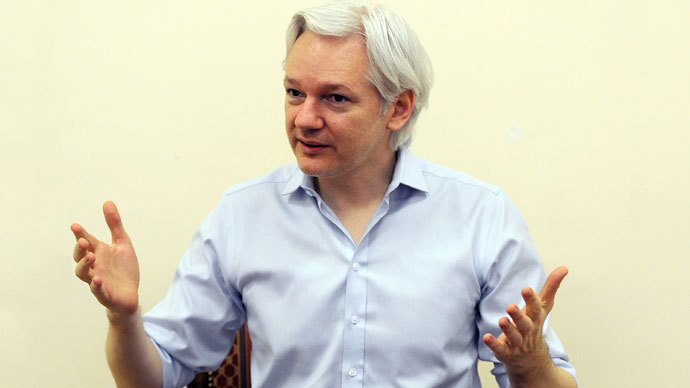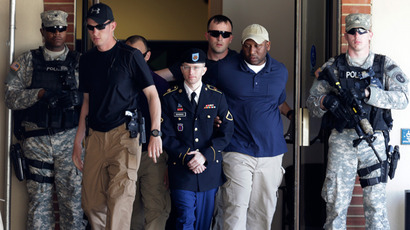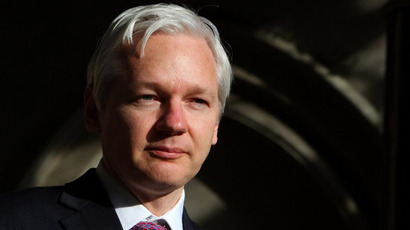Assange: Obama 'corrupted the presidency'

Exactly one year to the day after entering London’s Ecuadorian Embassy, WikiLeaks founder Julian Assange lashed out at the Obama administration Wednesday over the White House’s ongoing pursuit of leakers.
Citing the prosecution of alleged WikiLeaks source Bradley Manning and the recent case of Edward Snowden, Assange said President Barack Obama’s relentless efforts in office to hold Americans accountable for leaking state secrets is ravaging what remains of the reputation for a country once known for its vast press freedoms.
“We know from at least three national security reporters that their sources are hesitant to speak to them, and [they] explicitly cite the treatment of Bradley Manning as a reason as to why they are hesitant to disclose abuses by the United States government in the national security sector,” Assange told RT’s Andrew Blake in a conference call conducted from the embassy. “So already the Manning prosecution is harming the quality of Western democracy and the quality of reporting in the press.”
The conversation, conducted over the phone for around 90 minutes on Wednesday, afforded reporters the rare opportunity to discuss the highly contested cases against Manning, WikiLeaks and Snowden with some of the most knowledgeable experts on the subject of whistle-blowing. In additional to Assange, panelists included “Pentagon Papers” leaker Daniel Ellsberg and former National Security Agency analyst Thomas Drake, who was indicted in 2010 after complaining about surveillance practices within the NSA. Private Manning, a 25-year-old Army intelligence analyst, is accused of giving Assange and WikiLeaks classified documents that the Obama administration says harmed national security, and if convicted of the most serious of charges could spend the rest of his life in prison. He was detained in pretrial confinement for three years until his military court-martial began earlier this month.
“The broad case establishes a precedent that publishing national security related information about the United States is espionage,” Assange said.
“President Obama must do the right thing. He must immediately drop the immoral investigation against WikiLeaks, its staff and its sources,” he said.
Assange has yet to be formally indicted by a grand jury, but warned that other journalists and sources could suffer the same fate as either Manning or himself if they continue to expose state secrets, especially those critical of the current administration. The WikiLeaks founder has been attempting to get safe passage to Ecuador where he has been granted asylum, but the UK wants to extradite him to Sweden where he faces questioning over alleged sex crimes. According to Assange, the US Federal Bureau of Investigation has a 42,135 page file on WikiLeaks and another 8,000 relating specifically to his organization’s alleged relationship with Manning. If sent to Sweden, Assange has cautioned, he will likely be shipped to America and put on trial.
Commenting on the case of Edward Snowden, Assange said the US government is likely to charge the NSA leaker with espionage as well, and that even the Guardian journalists who published his evidence of widespread surveillance of American’s phone and Internet habits should expect prosecution.
“It is clear to me at this stage that Mr. Snowden . . . is being very aggressively pursued by the US national security sector, and there’s an open question as to whether the journalists, Laura Poitras and Glenn Greenwald, will be in the same position that I will be in in a year’s time,” he said.

“Will Glenn Greenwald be granted asylum by Brazil this time next year?” asked Assange.
But while the WikiLeaks chief had harsh words for the Obama administration during Wednesday’s presser, he fell short of accusing the current commander-in-chief from launching the alleged attack against journalists. In Assange’s point of view, that’s a mission that never would have made it off the ground if former-President George W. Bush didn’t start slashing civil liberties in the wake of the September 11, 2001 terrorist attacks. It was Pres. Bush who first authorized the programs exposed by Snowden, but only under Obama did those initiatives intensify.
“We’re seeing a shift from Bush to Obama,” insisted Assange. “Bush corrupted the presidency in his executive orders calling for mass seizure of telecommunications records from American companies like Verizon. To really corrupt the presidency you have to bring in an expert. You have to bring in a constitutional scholar. So Obama did it properly.”
The president didn’t stop there, though, Assange cautioned. “He not only corrupted the presidency in his pursuit of expanding to the horizon the power of the national security state, he also corrupted the court—the FISA [Foreign Intelligence Surveillance Act] court,” he said. “He corrupted the oversight committee in the Senate, he corrupted the US tech companies like Google and Facebook and others who are being led into feeding in that system.”
In the wake of Snowden’s revelations, the White House, Department of Justice and NSA have all defended the surveillance practices. Eighty-four-year-old Daniel Ellsberg, who leaked the now infamous Pentagon Papers during the Vietnam War, added during Wednesday’s conference call that while the Obama administration’s actions are unprecedented, they aren’t free from the influence of earlier administrations.
“President Obama has gone further than any of the others in using the apparatus of the government to shut down a process of revelations from within his government that he doesn’t control,” he said.
Ellsberg has spent the last several years drumming up support for Manning, WikiLeaks and Assange, and during Wednesday’s phone call said that Snowden and another whistleblower, former NSA agent Thomas Drake, “performed a very great service” by stepping forward the way they did. Like Manning, both Ellsberg and Drake were charged under the 1917 Espionage Act before their trials ultimately concluded with a comparably meager slap on the wrist. Even if that doesn’t match up to what Manning faces, though, Ellsberg said their cases aren’t without further comparisons.
“Each of us was willing to take a personal cost, a personal risk, to expose it to the public,” Ellsberg said, “So I see fundamental similarity there.”
Elsewhere, Ellsberg said he’d likely act just as Snowden did if provided the opportunity. “If I had documents showing that the NSA at that time was carrying out dragnet surveillance without suspicion, without probable cause—and in the early years, after 911, without even referring to these rubber stamp FISA courts —I’m sure I would have put that out at the time. But I didn’t see anything of that nature.”
But commenting on the likely fates that Snowden and the WikiLeaks source will be faced with, Ellsberg said there’s likely won’t be “more Bradley Mannings” in the near future.
“Well, don’t hold your breath. Fat chance,” said Ellsberg.

Later in the discussion, Assange said he’ll likely be indicted for espionage as a publisher, whereas Manning and Snowden both served as insider sources. “I’m a publisher and a journalist,” said Assange, “However, the law enforcement tools and the disturbing political rhetoric that has been implied has been the same in all three cases.”
“What’s happened here is national security became the state religion,” Drake added to the discussion.
“Now we have claims about what is illegal and what is illegal both with secret interpretations of the law erected by the DOJ, and secret courts where they don’t reveal how they process the law. And secret oversight committees. There is a pantomime of a legal process but there is no legal process that any common person in the world would recognize to be just,” Drake said.
On his part, Ellsberg said that the legal practices being enacted right now by the president are not necessarily constitutional, even if lawmakers let them be signed into law. Ellsberg called the surveillance techniques operated by the NSA and the FISA court “childish” and disagreed with the notion that the government will not abuse them in order to go after Americans never suspected of any terroristic activities.
The fourth week of Bradley Manning’s court martial will begin next Monday following a brief recess that has sidelines proceedings for this week. That trial is expected to wrap up in August, with the soldier likely to receive at least 20 years for the 10 counts he already pleaded guilty to. What lies ahead for Snowden, however, is something much less uncertain at this time. Following the publication of the leaked NSA papers, Snowden went into hiding in Hong Kong and has since dropped off the map.
“We are in touch with Mr. Snowden’s legal team and have been involved in the process of brokering his asylum in Iceland,” Assange said during the talk.














